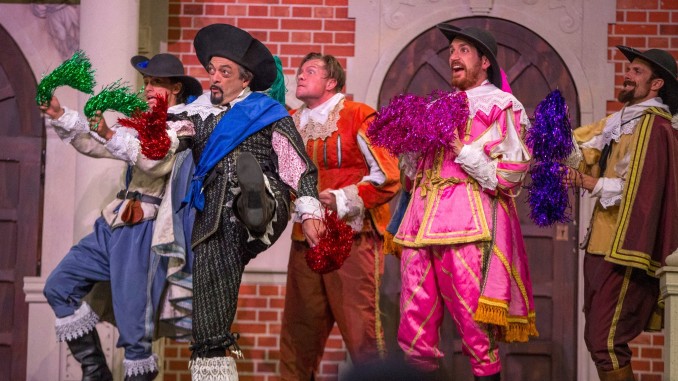
[Pop-up Globe 2017 Season]
At Auckland’s Pop-up Globe, Shakespeare is enjoying a 400-year-old career resurgence. Shattering any lingering perceptions that Shakespeare might be elitist or alienating, this year 80,000 people have paid paying anywhere from $1 to stand as a ‘groundling’ in the yard, to $299 for a royal room at the side of the stage. The atmosphere in the Pop-up Globe is like a mini-Vector arena concert. Social media is full of #popupselfies. Students are begging their teachers to be taken on class trips. It’s a theatrical phenomenon; but is it the bard or the building?
While the Shakespeare Globe which opened on London’s Bankside in 1997 is based on the first Globe built over Christmas 1598, the Pop-up Globe has bragging rights because it’s based on the second Jacobean Globe built in 1614 (the first burnt down after cannon fire used for Henry VIII ignited the roof). For this second season of the Pop-up Globe, the building is next to the Ellerslie Racecourse. Pop-up Globe 2.0 has a bigger stage, they’ve fixed the sight-lines and position of the columns, they have a pulley system, and are even tempting fate with cannons for Henry V. With an ornate roof depicting the heavens, and a beautiful mock-brick tiring house facade, their Pop-up looks less of a scaffolding job and a great deal more permanent.
The Queens company, with 4 female performers out of a total cast of 14, perform Much Ado about Nothing and Othello. The 16-strong Kings Company – all men – perform As You Like It and Henry V.
I have seen all four shows and can confirm the Pop-up Globe have knocked this season out of the Ellerslie park. The acting is superb and the storytelling could not be clearer. The comedies are actually funny, and the tragedy is actually moving. They present Shakespeare at his most populist. The cast take any and every excuse to interact with the audience. Standing in my prime groundling spot at the edge of the stage, I’ve had water tipped on me, been splashed by fake blood, had a croissant smooshed in my face by a French soldier, been the inevitable target of a bald joke, and clutched King Henry V’s hand. Purists would have an aneurism: they add one-liners, Bring it On cheerleading routines, and quote from those other great poets, One Direction.
In London, the modern Globe has attracted snobbery over its life-time. By returning to an approximation of the historical Elizabethan stage, it challenged centuries worth of totems as to how Shakespeare should be performed. This was something former Artistic Director Dominic Dromgoole alluded to in his open letter, written alongside one by his successor Emma Rice, giving advice to the future Artistic Director of the Globe. Dromgoole champions their support of BAME (Black, Asian and Minority Ethnic) casting and all-female companies. But after Rice’s subsequent innovations proved a little too progressive for the board (including – shock horror – the heretical use of lighting and sound), and was forced out (as she explains in her letter), the London Globe are in a period of soul-searching about what it means to perform Shakespeare for their venue. These questions reverberate over here. Ever since the Pop-up Globe arrived in Auckland last year, it has been a lightning rod for conversations about how we are doing Shakespeare in Aotearoa.
Due to Shakespeare’s ubiquity on the contemporary stage, his texts attract the entire spectrum of cutting-edge radical productions to highly conservative museum pieces. 401 years after Shakespeare’s death, his plays are at the front-lines in a contemporary battle for representation and gender and racial diversity. In the UK, Trevor Nunn’s all-white casting of a trilogy of Shakespearean history plays (which he defended as “historical verisimilitude”) was rightfully ridiculed. Characters are frequently gender swapped – the inspired casting of Tamsin Grieg as ‘Malvolia’ caused a Spectator columnist to splutter that “the obsession with diversity in theatre risks spoiling Shakespeare,” conveniently forgetting that Shakespeare’s malleable texts have been messed with for centuries.
While the Pop-up Globe is happy to mess with the texts in service of comedy, and they have made an effort towards ethnically diverse casting (with a strong Māori and Pasifika presence in both companies), in other respects they are deeply conservative and out of touch with the conversation. While the bard comes to life in the building, the Pop-up Globe have less to say about how Shakespeare’s plays have resonance for our own time and place.
Why do Shakespeare?
In Australia, playwright Lachlan Philpott called for a moratorium on Shakespeare productions for five years to “allow space for other living writers to flourish in the gaping gaps his absence leaves.” As a Shakespeare fanatic, I violently disagree with the idea of a ban, but the underlying provocation is worth considering: do not put on Shakespeare just for the sake of putting on Shakespeare.
For the most part, the productions on offer at the Pop-up this season do not justify their reason for being other than needing to be made for the space. By being made historical (via sumptuous costuming) yet highly accessible (with contemporary references), the productions do not offer a strong directorial point of view about the actual plays (though this may come as a relief for those tired of auteur directed Shakespeares). Instead, they experiment with how the plays can work within a Jacobean performance space. This is their major selling point and it has a great deal of value. In the words of Miles Gregory, the Pop-up Globe artistic director, “if [Shakespeare’s] work is performed in a way that responds to that space and makes a direct connection with the audience then it becomes very comprehensible.” The Pop-up blows away anxieties about ‘not getting Shakespeare’ and reinvigorates the plays as broadly accessible entertainment (as they were in their own time).
One of my former high-school teachers, who had bought her students to a matinee of Henry V, told me that the prospect of the Pop-up Globe had made her students excited about theatre, and many were begging to attend. That particular matinee was all but empty, but the engagement and reactions by the students in the groundlings turned it into a very special experience. They were delighted to be so close to the actors, to be acknowledged, and they played back. The Pop-up Globe can change perceptions about what theatre and Shakespeare can be like. Attending a performance at the Pop-up Globe can be life-changing.
I continue to go to Shakespearean plays I have seen and studied countless times before to see what else I can discover about the plays. Shakespeare’s characters are always questioning and renegotiating their selves, never reaching any fixed position. Nor do the plays. We keep going back because of their ambiguity and adaptability. Any production of Shakespeare limits the text, because it favours one interpretation over an infinite number of other possibilities. It’s all about what frame you put around it, and why you are doing it. While the Pop-up Shakespeares are performed with immediacy, they are largely disconnected from what is happening outside the Globe.
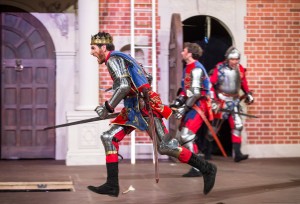
There is no particularly good reason to do Henry V in Auckland, or at least, the Pop-up Globe did not find it. When it is performed in England it has historical resonance, but for a play featuring war between England and France, there is surprisingly little dramatic conflict. It’s like a filler episode on Game of Thrones, sitting in-between the good stuff in the History cycle (and unforgivingly, Shakespeare kills off Falstaff ‘of-screen’). Still, carried along by the gritty determination of Chris Huntly-Turner in the title role, the Pop-up Globe give us a thrilling, heart-pounding production. There are sword battles, canons, and flaming arrows (yes, FLAMING ARROWS). Go for the iambic, stay for the spectacle.
Their Othello is intense and unforgiving. Te Kohe Tuhaka’s Othello is more authoritative than charming, and the incorporation of tikanga in his physicality is powerful. He’s used to being obeyed, and we see him ordering Desdemona around long before Iago sets the green-eyed monster to work. Director Ben Naylor is not interested in setting us up to like Othello prior to his downfall. Usually Iago bends the play to his will, but this production shows the character (played by Haakon Smestad) to be more the beneficiary of a happy series of circumstances rather than ones of his own making. His character is undercut from the start by making him the victim of a ‘turn your phones to flight mode’ gag, and therefore has to work harder to establish his malignancy. Though the leads are played with less complexity than might be expected, Naylor drives us through to the tragedy with brutish economy, and Desdemona’s (Jasmine Blackborow) death scene is particularly uncomfortable.
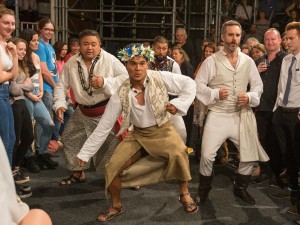
Much Ado About Nothing recognises Auckland as a Polynesian capital. Under Miriama McDowell’s direction, Messina becomes a cross-cultural island society, with Dogberry’s Watch an entertainingly militant border security force, tasked with ensuring no undeclared fruit gets in. (Their nauseatingly cute sniffer dog rather steals the show.) The expression of Polynesian cultures occurs throughout, such as the siva and rituals used as Hero and Claudio prepare to marry. Of the four productions, this is the one that is most relevant to our local context, as if Shakespeare might be an Aotearoa local rather than a colonial import.
The final production, As You Like It, with men cross-dressing as female characters, is playfully homoerotic. There is a will from the audience not just for the characters to find their romantic pairs, but for the male-gendered actors to get together, and there are screams of delight, particularly from younger audience members, whenever there is a pash or even a suggestion of attraction. In Shakespeare’s text Rosalind (played here by Jonathan Tynan-Moss) disguises herself as a man, Ganymede, and later becomes the object of unwanted romantic attention by a shepherdess named Pheobe. In the Pop-up production, the homoerotic subtext is bought into the foreground by gender swapping the character as a male, Phebus (Jonathan Martin). In the text Ganymede declares he is “for no woman,” which in this context, actually encourages the would-be suitor. Though Tynan-Moss’ Rosalind/Ganymede does not reciprocate, Phebus’s desire is normalised, and ends up with Silvius (Joe Dekkers-Reihana) in time for the final jig. The production celebrates male for male desire, and with Phebus and Silvius, it is out and proud. The queer celebration is one positive way that As You Like It connects with our contemporaneity, but conversely, Ganymede’s “no woman” line draws attention to the productions contradictory strain of Shakespeare conservativism: in As You Like It on the Pop-up stage, as on Shakespeare’s stage, there are no women at all.
Pop-up’s Gender Trouble
Late last year on The Spinoff actor Laura Irish, who was refused an opportunity to audition for the Pop-up company, called out the discriminatory gender casting ratios. The issue was covered by the NZ Herald in January. Victoria University theatre lecturer Lori Leigh disputed arguments that all-male casting was ‘historically accurate’, and asked why it was seen as acceptable to continue “to tell stories and history through a male lens, taking away ownership from women.” Commercial Director Tobias Grant defended their stance: “of the 84 people who work with the Pop-up Globe organisation 40 were women including the general manager and head of sales and marketing.” This is little comfort to female actors looking for employment.
In an interview with Kate Prior at The Pantograph Punch, Pop-up Globe artistic director Miles Gregory expressed that “publically criticising artists for the gender balance in their work, to me, is dangerous. Because it can go both ways. It becomes a tool. It politicises work.” Gregory warns against the threat of artistic censorship, and argues that artists are within their rights to be offensive. This statement makes the case for artistic freedom, but also appears to discount any social responsibility the artist making the work might also have. It devalues debate, and the reasons why people might hold a counter view. Furthermore, to imply that their work is apolitical is myopic, failing to recognise the way that their choice to support an all-male company for a second year is, like it or not, an inherently political statement in the context of contemporary feminist activism, gender equity debates, and this battle over how we do Shakespeare.
I will proceed to throw caution to the wind and publically criticise the Pop-up Globe’s gender balance (as I also did during their last season). As a critic, this is my role and duty. Actually, I think gender balance is exactly what is wrong with the Pop-up Globe’s approach. It is not all-male casts that I disagree with per se (I have already mentioned some fascinating aspects of their cross-dressing As You Like It), but the lack of commitment to balancing this with equitable casting in other productions. Over their 2016 and 2017 seasons they have given spaces in the company to seven female actors versus thirty-eight male actors. These numbers are shameful.
The Pop-up Globe’s website outlines their artistic vision, including why all-male casts are so critical to how they do their Shakespeare:
We believe that because Shakespeare originally wrote his plays for an all-male company, and because we perform our work in a replica of a Jacobean theatre, part of our artistic output should incorporate single-sex productions performed in historically accurate costume. We believe that single-sex productions continue to offer new insights into Shakespeare’s plays, particularly those that focus on gender and identity, and provoke constructive debate and lively discussion around gender, sexuality and our contemporary society.
The reference to Shakespeare’s all-male company is technically correct, but misleading. Shakespeare’s female roles were written for highly trained boy actors, aged between 10-20 (puberty hit much later). Productions would need to employ prepubescent youths to even begin to start simulating historical accuracy. In The Pantograph Punch interview, Gregory walked away from any claims of historical accuracy – “we don’t talk about authenticity – we’re not authentic” – eventually settling on the idea that they are about “integrity… work that has integrity.” In any case, any implicit claims to authenticity are null and void when you have Orlando use One Direction lyrics when composing poetry to express his love for Rosalind.
An alternative approach on how to do Shakespearean casting was provided by another As You Like It this year, from the University of Auckland’s Summer Shakespeare. Embracing the permission that the play’s title gives a director, Benjamin Henson set the play at a Glastonbury-type Festival, used a live DJ, and employed gender-fluid casting. (Henson drew attention to fluidity by having the roles of actors Murdoch Keane and Bronwyn Ensor decided by chance each night.) Summer Shakespeare has been a tradition at the University of Auckland since 1963. Their As You Like It struggled due to the forces of Auckland Weather, and the Globe’s gravitational pull attracting Shakespeare lovers to Ellerslie, but both production were wonderfully entertaining and strong productions in their own right, offering very different frames on the play.
Back on the the Pop-up stage, the Queens Company features four female actors. Much Ado belongs to Jacque Drew and her quick-witted Beatrice. It is refreshing particularly to see a middle-aged actor cast, with all the lived experience that she brings to the role. Much Ado’s second female lead, Hero, has notoriously few lines, but Victoria Abbott imbues her with as much intelligence and complexity that she can muster from the text and stage-time. (Hero’s story is one of silencing and shaming after she’s accused of being unfaithful.) In Othello, Abbott plays Bianca, a courtesan, for a few scenes in the second-half.
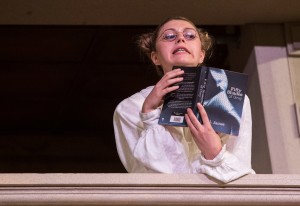
Jasmine Blackborow and Roimata Fox have even less to do in Much Ado, but are impressive in Othello as Desdemona and Emilia respectively. Anxieties about cuckolding appear in both plays, exposing a fragile masculine ego, but the fates of Hero and Desdemona are dictated by the genre. Roimata Fox’s Emilia becomes the character to watch. Often overlooked, her demeanour tells us everything we need to know about her abusive marriage with Iago, but she fiercely fights for agency, turning the balance of the play towards her corner.
Though Shakespeare wrote some great parts for women (or rather, boy actors), we can see that it is feast or famine when it comes to parts for female actors. Laura Irish pointed out that “out of the 37 plays currently attributed to Shakespeare, about 83% of the roles are male, 12% are female and 4% are ambiguous.” There is therefore a need to cast women as characters beyond the prescribed gender in the script (and for more than just one scene like Drew in Othello as the Duke of Venice, though her character’s leadership role did lend an interesting commentary on female collaboration with the patriarchy).
I agree with the Pop-up’s artistic statement that Shakespeare can provoke “constructive debate and lively discussion around gender, sexuality and contemporary society.” It is not a radical idea, but done well, all-male companies can draw attention to the ways that gender is performative. As Judith Butler wrote in Gender Trouble, “gender is an identity tenuously constituted in time, instituted in an exterior space through a stylized repetition of acts.” Gender is a fabrication, a performance naturalised through repetition. But male single-sex productions are not the only way to draw attention to this. Keep the replica theatre, keep the costuming, but we do not need to keep the discrimination.
If you must go the all-male route, as the Pop-up insists is their right, As You Like It is a good play to choose. The cross-dressing and code-switching of the play is dealt with in a knowing way by Shakespeare. You can read a direct challenge to fixed concepts of masculinity and femininity since gender can be changed so easily with a costume (though in the Summer Shakespeare production Ganymede’s contemporary garments are rather unisex, which more overtly suggests it is less about the clothes, more about the attitude). Shakespeare was working within the conventions of the time to have a big conversation about gendered assumptions.
At the Pop-up, Tynan-Moss plays Rosalind playing Ganymede via a gross overcompensation of masculinity. Ganymede becomes a laddish nitwit – think Jay from The Inbetweeners. Compare this with Francesca Savige in the Summer Shakespeare production. The freeing of inhibitions in Henson’s Glastonbury ‘Concert of Arden’ mirrors the freedom Rosalind now feels in her male gendered disguise. Critically, whereas Savige plays the character, Tynan-Moss plays the gender parody only, and the Pop-up production is weaker for it.
When asked if all-male companies sell more tickets, Miles Gregory replied, “No, what I’m saying is that in our first season we experimented with an all-male company and it sold a lot of tickets,” but goes on to admit that “all-female work is slightly risky.” Cynically, an all-male As You Like It is a commercially driven decision, because of the perception that men dressed as women is what audiences associate with Shakespeare and want to see, and this feedback loop is reinforced by its production. Artistically, the production justifies itself with a subversive exploration of desire and gendered performance. (Conversely, the cross-gendered acting of Henry V added little value.)
It is a choice that imposes one set of meanings on the play, over a multitudinous sea of potential other meanings. Historical accuracy is a straw-man: all-male casting tells us little about how the play would have operated in Shakespeare’s day, because we do not know if they would have received it in a similar way.
Shakespeare for Today

As You Like It’s epilogue is given to Rosalind. She admits that “it is not the fashion to see the lady the epilogue,” but counters that “it is no more unhandsome than to see the Lord the prologue.” (Go Shakespeare! Smash that stage patriarchy!) Shakespeare has one last wink to the boy actor’s cross-dressing when the character says, “If I were a woman I would kiss as many of you as had beards that pleased me, complexions that liked me, and breaths that I defied not.” The Pop-up Globe production rather over-labours the point at this moment by having Tynan-Moss take off his wig and female garments, just in case we had not already caught the irony.
If the Pop-up Globe returns for a third year, they should consider taking the wigs off the men from the start. With three all-male productions under their belt, it’s time for the Pop-up Globe company to move on and give us a new trick. Have conversations about gender, and do it in more interesting ways than just male cross-dressing. They are overdue for an all-female production. Embrace fluidity. Artistically, an all-male cast is the lazy option.
Gregory defends the choices they have had to make as a young company, figuring out how to pull it all off. Their achievement to date is remarkable: producing six in-house shows, selling 180,000 tickets over two seasons, providing sustained employment for their company on and off-stage.
There is a real opportunity through the Pop-up for Aotearoa to become the leading producer of Shakespeare in the Southern Hemisphere (if they choose to stay). Audiences around the world could come here expressly to see the Pop-up Globe and its productions. But first, there are some issues to address as the company continues to grow.
For the wider sector, Pop-up Globe threatens the long-term sustainability of Summer Shakespeare. The siphoning of University audiences is short-sighted, because those cutting their teeth underneath the Uni clocktower could potentially be the future performers of the Pop-up Globe. There needs to be goodwill and co-operation, and some way of ensuring that they do not choose the same play.
For their own ongoing sustainability, the Pop-up need to really consider the resonance of the productions and what they can say to us, and how they go about casting them.
Hamlet said it best in his advice to the players: the purpose of theatre is to hold “the mirror up to nature, to show virtue her own feature, scorn her own image, and the very age and body of the time his form and pressure.” If they were to really hold up the mirror, Pop-up Globe would recognise the current conversations around representation, feminism, and gender inclusivity, and get with the play.
This year, the Pop-up’s Much Ado About Nothing most successfully transcends the building. Its integration of Polynesian culture gives Aucklanders a vision of how we should be. That’s a great model to continue to build upon.
If we are doing Shakespeare, we need to do it for today; for our own form, pressure, and locality. That way, the Pop-up can truly become more than the sum of its scaffold.
The 2017 Pop-up Globe season runs until the 19th May.
PS: I have been invited to be panelist for the Pop-up Globe’s discussion All-male Shakespeare: Historically Accurate or Sexist? on Tuesday 2nd May, 5:30pm at the Pop-up Globe. I’m pleased the Pop-up are engaging and I look forward to the debate!


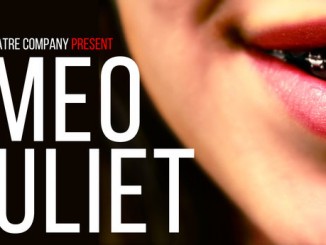
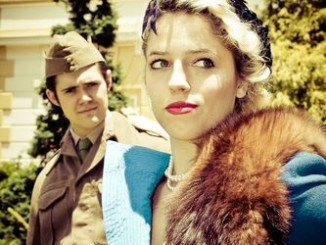
Excellent article! Thank you, James.
As you like it….